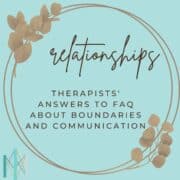
Boundaries and communication are two of the most critical components of healthy relationships, yet they are also among the most misunderstood. Many people struggle with setting clear personal boundaries, while others find it difficult to communicate their needs effectively.
To clarify some of the most common concerns, we’ve gathered insights from therapists to answer frequently asked questions about boundaries and communication.
Learn more about therapy for communication and boundaries
1. What Exactly Are Boundaries, and Why Do They Matter?
Boundaries are the limits and guidelines we establish to define what is acceptable and what isn’t in our relationships, whether with family, friends, coworkers, or romantic partners.
Healthy boundaries help:
- Protect emotional well-being – You avoid feeling drained or resentful.
- Define personal space and autonomy – You know where you end, and others begin.
- Encourage respect and trust – Relationships thrive when everyone’s limits are honored.
Without clear boundaries, people often experience burnout, emotional exhaustion, and difficulty maintaining fulfilling relationships.
2. How Can I Tell If My Boundaries Are Too Rigid or Too Loose?
Boundaries exist on a spectrum:
- Rigid Boundaries: You keep people at a distance, avoid vulnerability, and struggle to ask for help. You may feel “safe,” but at the cost of deep connections.
- Loose Boundaries: You say “yes” when you mean “no,” take on more than you should, and feel guilty for asserting yourself. This can lead to resentment and burnout.
- Healthy Boundaries: You communicate your needs with clarity, respect your own limits and others’, and maintain relationships built on mutual understanding.
Therapist Tip: If you feel exhausted, resentful, or frustrated in your relationships, it may be time to evaluate where your boundaries fall.
3. Why Do I Feel Guilty When I Set Boundaries?
Many people associate saying “no” with being selfish or unkind. This belief often comes from childhood conditioning or cultural expectations that prioritize pleasing others over self-care.
- Guilt is common but not a sign you’re doing something wrong.
- A therapist can help reframe boundary-setting as an act of self-respect rather than selfishness.
- Boundaries protect relationships by ensuring your interactions are based on authenticity, not obligation.
Reminder: You are not responsible for other people’s reactions to your boundaries.
4. How Can I Communicate My Boundaries Without Sounding Harsh?
Many people avoid setting boundaries because they fear being seen as rude or confrontational. However, assertive communication is neither aggressive nor passive—it is clear, respectful, and firm.
- Use “I” Statements:
- Instead of: “You never respect my time!”
- Say: “I feel overwhelmed when my time isn’t considered. I need better communication about plans.”
- Be Direct but Kind:
- Example: “I can’t take on extra work right now, but I appreciate you thinking of me.”
- Stay Consistent:
- People will test new boundaries. Be prepared to repeat them calmly and without guilt.
5. What If Someone Pushes Back Against My Boundaries?
When you start setting boundaries, some people will resist, guilt-trip, or ignore them. This is not a reason to stop—it’s a sign they were needed.
- Stay firm and repeat your boundary if necessary.
- You don’t owe an explanation or debate. “I understand, but this is what works for me.”
- Distance may be needed from people who consistently violate your limits.
Red Flag: If someone gets angry or punishes you for asserting a boundary, they may not respect your autonomy. Healthy relationships honor each person’s needs.
6. How Do Cultural and Family Backgrounds Affect Boundaries?
Culture plays a major role in how people view boundaries.
- In collectivist cultures, family and community needs often take priority, making individual boundaries feel unnatural or even disrespectful.
- In individualist cultures, personal autonomy is emphasized, and people are encouraged to set firm boundaries even in close relationships.
Family dynamics also shape boundary patterns. Enmeshed families may discourage independence, while strict households may instill rigid, inflexible boundaries.
Therapist Tip: Boundaries should reflect what works for you, even if they differ from what you grew up with.
7. How Can I Set Boundaries at Work Without Damaging My Professional Reputation?
Professional boundaries are essential for avoiding burnout and maintaining work-life balance.
- Set clear expectations about your availability.
- Use professional yet firm language when declining extra work.
- Avoid over-apologizing for setting limits.
- If necessary, involve HR to reinforce boundaries.
Maintaining professional boundaries improves productivity and job satisfaction.
8. How Can Parents Teach Healthy Boundaries to Children?
Parents model boundary-setting through their own behavior.
- Encourage children to express their needs and emotions.
- Respect their physical and emotional space.
- Teach the difference between “safe” and “unsafe” secrets.
- Reinforce that saying “no” is okay in appropriate situations.
9. How Do I Repair Relationships That Were Hurt Due to Poor Boundaries?
Acknowledge past boundary mistakes and openly communicate your new intentions.
- Apologize where necessary but don’t over-explain.
- Set clear boundaries moving forward.
- Allow time for trust to rebuild.
Consistency in respecting boundaries strengthens relationships over time.
10. Can Social Media Affect My Boundaries?
Social media often blurs boundaries between personal and public life.
- Limit time spent engaging with stressful content.
- Set privacy controls to maintain digital boundaries.
- Avoid comparing your life to others online.
Unplugging when needed helps maintain emotional well-being.
11. What Are the Signs That Someone Is Violating My Boundaries?
Therapists’ Answer: Key warning signs include:
- They dismiss or ignore your stated limits.
- They pressure you into decisions you’re uncomfortable with.
- They guilt-trip or manipulate you.
- You feel anxious or drained after interacting with them.
Recognizing these patterns can help you reinforce your boundaries.
12. Can Therapy Help Me Set and Maintain Boundaries?
bsolutely. Different therapy modalities offer structured tools for improving boundary-setting and communication.
Types of Therapy That Help
There are many different approaches to therapy and most of our therapists combine modalities to meet your specific needs. A few of the types of therapy that help with setting and maintaining boundaries in relationships include:
- Cognitive-Behavioral Therapy (CBT): Helps reframe negative thoughts around guilt and self-worth.
- Emotion-Focused Therapy (EFT): Strengthens emotional awareness and communication skills.
- Gottman Method (for couples): Teaches clear, structured boundary discussions.
- Family Systems Therapy: Examines family dynamics and boundary issues.
- Mindfulness-Based Cognitive Therapy (MBCT): Develops self-awareness to detect boundary violations early.
Not sure where to start? A therapist can help assess your needs and guide you toward healthier communication patterns.
Browse our Therapist Directory




